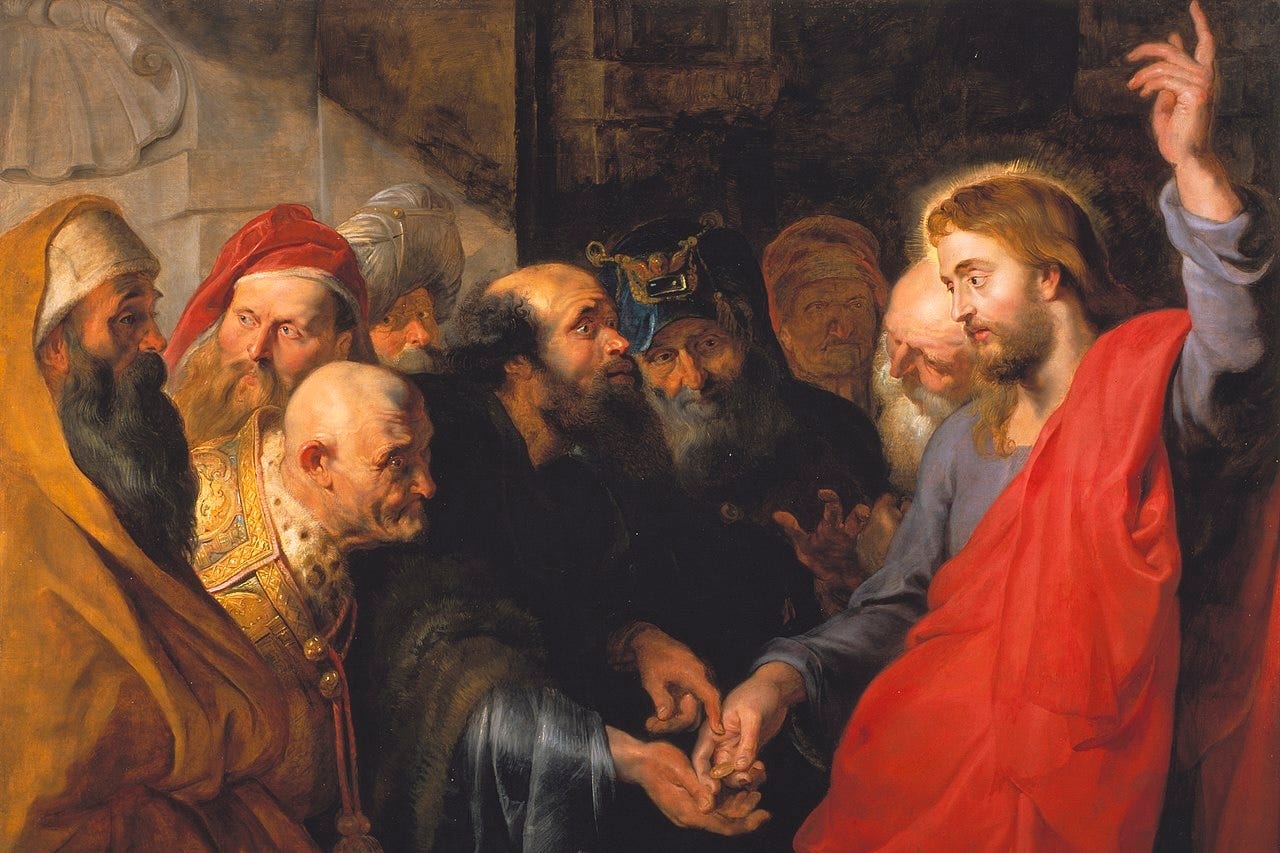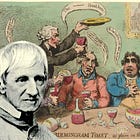Should we pay taxes?
'Render unto Cæsar that which is Cæsar’s, and to God that which is God's'—but why did this answer so silence Christ's enemies, and what does it mean for us today?

In this chapter…
Our Lord’s masterful answer to his enemies’ trick question
The value that even a tyrannical authority provides the people
How we should apply Our Lord’s principles today.
Although this extract of the Gospel is read towards the end of the Sundays after Pentecost, it falls within Holy Week, and (according to St Matthew’s Gospel, and Fr Coleridge’s ordering) immediately follows the Gospel for the Nineteenth Sunday after Pentecost.
We sometimes hear the Gospels at Mass without any sense of where they fall in Christ’s life. Works like Coleridge’s can help us appreciate the growing tension behind episodes like this—as well as make us wonder why the Church places this reading where she does.
Why do you think this reading falls at this time of the liturgical year?
See also:
'The Question of Tribute'
From
Passiontide, Part I
Fr Henry James Coleridge, 1886, Ch. VI, pp 115-122
St. Matt. xxii. 15—22; St. Mark xii. 13—17; St. Luke xx. 20—26; Story of the Gospels, § 138.
(Read at Holy Mass on the Twenty-second Sunday after Pentecost)
The plot against Our Lord
The three first Evangelists tell us that after the parables in which our Lord had spoken so openly against His enemies, the Chief Priests and Pharisees, the latter withdrew from openly molesting Him in His teaching, as they clearly discerned that His purpose was to expose and attack them.
They did not dare, especially as the time of the great feast was drawing on, to risk open violence against Him. He was safe whenever the people were present, who at all events held Him as a prophet. The Chief Priests had not at all abandoned their intention of putting Him to death, but they were afraid to execute it in the face of the multitude.
There was one power in Jerusalem greater than their own, and this was of course the power of the Roman Governor. Our Lord’s enemies, therefore, hit upon a plan which would, as they hoped, give them an opportunity of bringing Him into collision with this power.
Ever since the annexation of Judæa to the province of Syria at the time of the deposition of Archelaus, the question of the lawfulness of paying tribute to the foreign rulers of the country had become more pressing. Even under Herod and his son, who were nothing more in truth than the delegates of Rome, it must have been in the minds of zealots among the Jews that they were a free and holy nation, and ought not to pay tribute to any but a sovereign of their own nation, and that Herod could only be called such in a very lax sense indeed.
The question of the day
But when, in the course of time, the Herodian kingdom came formally to an end by the dethronement of Archelaus, and the appointment of a Roman Procurator, the subjugation of Judæa became still more undeniable, and no pretext was left for considering them subject to a king of their own.
We hear of the insurrection of Judas of Galilee about that time. That insurrection was quenched in blood, and it must have been evident to sensible men that the nation was not on the whole inconsiderately governed by the Romans, and that a state of things was in possession which implied a tacit acquiescence in their domination.
Still, there was the theoretical question, which seems to have been agitated from time to time in the Pharisaical schools, and probably there were always some to maintain the stricter view, by which it was considered even unlawful to acknowledge the supremacy of Cæsar by paying him taxes.
This question, then, the Pharisees determined to put to our Lord. They hoped that He would be unable to answer it either way without danger to Himself. An answer against the lawfulness of paying tribute to the Romans would bring Him under the notice of the Governor as a supporter of insurrection. An answer in favour of the practice might alienate from Him the favour of the people, ever jealous of anything that seemed to touch their national rights and their notions of independence.
How it was put to Our Lord
All the three Evangelists tell us of this plot.
‘Being upon the watch, they sent spies, who should feign themselves just men, that they might take hold of Him in His words, that they might deliver Him up to the authority and power of the Governor.’
This is St. Luke’s account. The other two mention the particular persons who entered into this plan.
‘Then the Pharisees going consulted among themselves how to ensnare Him in His speech, and they sent unto Him their disciples with the Herodians.’
That is, the religious party, the men who were sticklers for the strict observance of the Law, and who were consequently opposed by the laxer sort of men, ready to go all lengths in concession to their pagan masters, leagued together with these last on the subject of a question which was constantly argued between them, as if it was to be settled by reference to our Lord Whom they hoped thus to endanger either in His life or in His popularity. They came to Him with words full of flattery and adulation.
‘And they asked Him, saying, Master, we know that Thou art a true speaker, that Thou speakest and teachest rightly, and carest not for any man, for Thou regardest not the person of man, but teachest the way of God in truth. Tell us, therefore, what Thou dost think, is it lawful for us to give tribute unto Cæsar, or not? or shall we not give it?’
The Evangelists seem to have been careful to preserve the very words in which these insidious questioners laid the snare which they were setting. They were clever men of the world, in their own conceits, like the orator Tertullus in the Acts, who began his charge against St. Paul before Felix with complimentary sentences of the same sort.
They thought, perhaps, that they would easily outwit the simple, meek, truthful preacher from Galilee, little deeming that in Him dwelt all the wisdom and the majesty of the Godhead, and that they were trying to deceive One Who read the thoughts of their hearts before they rose to their lips,—One Who knew with what intention of malice they asked the question, how false were all their compliments about His truthfulness and disregard of human respect, how false, too, the desire which they alleged of hearing from Him the way of God in truth.
His answer
‘But Jesus, knowing their wickedness, their vileness, considering their guile, said to them, Why tempt you Me, ye hypocrites? Show Me the coin of the tribute, show me a penny that I may see it. And they brought it to Him. They offered Him a penny.
‘And Jesus saith to them, Whose image and superscription is this? They answering Him, said to Him, Cæsar’s. And Jesus answering said to them, Render therefore to Cæsar the things that are Cæsar’s, and to God the things that are God's. And they marvelled at Him. And they could not reprehend His word before the people, and wondering at His answer, they held their peace.’
This answer of our Lord, which solved the question to the confusion of the questioners, contains the whole general doctrine which was afterwards drawn out by St. Paul in the Epistle to the Romans, and in that to St. Titus.1
It was not the object of our Lord, as it seems, to draw out the doctrine in full, in this place, for the question was not put honestly, but only in order to entrap Him. The Romans had been practically the rulers of Judæa since the troubles which ended the reign of the Asmonæan dynasty. It might be an abstract question whether they had rightfully acquired their sovereignty, but they had at least been long in undisputed possession, nor was there the slightest practical opposition to their rule.
But our Lord does not go into the question of title at all. He takes the plain obvious fact of the political condition of Judæa as a subject province to Rome, and implies that that is enough for the obligation of conscience.
The coinage of Rome was current in Judæa, as the coinage of the acknowledged sovereign. The fact implied that the Jews lived under the protection of the Roman arms, and, as far as they were imposed on them, of the Roman laws. The Romans kept the peace for them, administered the laws, or allowed them their own laws as far as they saw fit. They were the ministers of God, as St. Paul says, serving unto this purpose. They protected life and property, they secured the citizens their social rights, and chastised outrages and violations of the law.
In return for all this, they exacted tribute. Those who profited by the peace which they secured, the protection against lawlessness, the administration of justice, the security of the family and the home, which were the results of their dominion, had duties in return to discharge towards them. Thus our Lord says, ‘Render,’ give back ‘to Cæsar the things that are Cæsar’s, and to God the things that are God’s.’
The time came in the history of the Church when Cæsar asked more than belonged to him, and interfered with the rights of God. Christians could not give in to such demands, they suffered tortures and death in consequence, but they did not rebel. They left their cause to God, Who is the Supreme Author and Ruler of society, and in Whose hands it lies to remove kings and emperors, kingdoms and empires.
The importance of the doctrine
Our Lord knew how momentous for the welfare of society and the Church, which requires nothing but peace to carry on her beneficent work in the world, were to be the questions which are involved in the duty to the civil ruler, who receives his power from God.
This was not an occasion on which it would have been suitable for Him to lay down the whole details of the doctrine, but He summed it up in the epigrammatic form with which we are so familiar, which contains in itself the elements of the whole truth.
He spoke once again, in the course of His Passion, a few words on the same subject, in vindication of the Divine origin of human government, the responsibilities of those in whose hands it rested, and the consequent iniquity of those who divert it to an unjust use: ‘Thou shouldest not have any power against Me,’ He said to Pilate, who was boasting of his power to crucify Him and to release Him, ‘unless it were given to thee from above. Therefore, he that delivered Me to thee hath the greater sin,’2 his sin of injustice in itself is enhanced by his using for his malicious purpose a power which came from God. It is God Who has conferred on men the right by which they govern others, and it is He, therefore, Whose power is abused when a conscious wrong of oppression, or the like, is committed.
Here, as far as we know, our Lord left the matter of the rights of the civil governor, and His words became the text by which the Apostles were guided in their teaching. St. Paul, having laid down the duty of living at peace with all men, as far as is possible, adds, ‘Let every soul be subject to higher powers,’ using the same word which our Lord used to Pilate, meaning ‘authority.’
‘For there is no power but from God, and those that are, are ordained of God. Therefore, he that resisteth the power, resisteth the ordinance of God, and they that resist, purchase to themselves damnation. For princes are not a terror to the good work, but to the evil.
‘Wilt thou then not be afraid of the power? Do that which is good, and thou shalt have praise of the same. For he is God’s minister to thee, for good. But if thou do that which is evil, fear, for he beareth not the sword in vain. For he is God’s minister, an avenger to execute wrath upon him that doth evil.
‘Therefore, be subject of necessity, not only for wrath, but also for conscience’ sake. For therefore also you pay tribute, for they are the ministers of God, serving unto this purpose.’3
The passage of St. Paul
In this famous passage St. Paul repeats three times over that civil authorities are the ministers of God.
No doubt those for whom he wrote had many complaints against the rulers under whom they lived. He was writing to a Church composed, almost equally, perhaps, of Jewish and Italian Christians, and yet he makes no mention of the modern principle of nationalities.
And our Lord, when He was laying down the principle before us, knew well enough how many thousands of the children of the Church, and others outside the Church, in every generation, were to be ground down under injustice and tyranny, for which in the course of His Providence, He meant ample redress to be exacted.
The history of the world is the history of the succession of
Empires, on their way
To ruin; one by one,
They tower, and they are gone,
each ‘giant form’ in the series, as it were, eating up its predecessor for unfaithfulness in its Providential trust and for cruelty to its subjects.
‘I will repay’
It is the same with royal houses and dynasties, the chastisement of whose misdeeds against the Church and mankind falls often, as we see, on innocent generations, who have to expiate the sins of their ancestors.
God does not leave any evil of this kind unavenged, even here below. He brings about redress and chastisement in due time, and by instruments of His own choosing. In our own generation the world is full of the fragments of dissolved empires and the heirs of dethroned dynasties and houses that were once royal. ‘Vengeance to me, I will repay, saith the Lord,’ and the remedy is far safer and more full of mercies when it is left to Him, Who never fails in His promise, ‘I will repay.’
But the times and seasons, the instruments and means, of this repayment are in His hands, and His Providence works out His Will in these matters with infinite justice and mercy, with the highest wisdom and the tenderest consideration for the good of all.
From Fr Henry James Coleridge, Passiontide, Part I.
If you’re enjoying reading Father Coleridge’s rich explanations of the Gospels and the life of Our Lord, then will you lend us a hand and hit subscribe?
Further Reading:
Follow our projects on Twitter, YouTube and Telegram:
1 Romans xiii. 1—7; Titus iii. 1.
St. John xix. 11
Rom. xiii. 1-6





